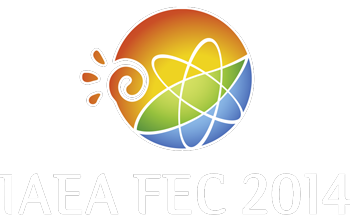Speaker
Mr
Marc Goniche
(France)
Description
Interaction of radio-frequency waves with the edge plasma of tokamaks from which the wave is launched is now well recognized for waves in the Ion Cyclotron Range of Frequency (ICRF) but also in the range of Lower Hybrid Current Drive (LHCD) frequencies.
A dynamic Stark spectroscopic measurement was carried out near a Tore Supra LHCD antenna, demonstrating that indeed the electric field oscillating at 3.7GHz, in the range of 1-2kV/cm for high power (1-4 MW/antenna) experiments, could be measured with a reasonable accuracy in the vicinity of the antenna. The spectroscopic sightline was provided by an endoscope viewing a region around the left-hand side of the antenna, including the lateral protection limiter (LPL). D-beta spectral line profiles were measured and the data were fitted to an all orders spectral line profile model. The spatial region from which the light is mostly collected near the antenna, determined from simulation, has a typical radial extension of 6cm from the LPL.
Experimental spectral profile of the D-beta line fits very well the simulated profile only when a radial polarization of the electric field is considered, as expected when the slow wave penetrates more dense plasmas. This measurement has been performed on numerous Tore Supra pulses with power launched by the LHCD antenna varying between 0.1MW and 3MW. It is found a good quantitative agreement between measured and modeled ERF (from full-wave coupling modelling) as long as the power launched by the upper modules (half of the total power) exceeds 0.5 MW. Noticeably, when the most outer waveguides are switched off, the measured field does not vary significantly as would be expected from the model. This unexpected result is thought to be the consequence of the bending of the rays during the propagation, with those originating from the outer waveguides evading the main emission region.
| Country or International Organisation | France |
|---|---|
| Paper Number | EX/4-2 |
Author
Mr
Marc Goniche
(France)
Co-authors
Dr
Annika Ekedahl
(CEA, IRFM)
Dr
Bernard Pégourié
(CEA, IRFM)
Mrs
Christine BOTTEREAU
(CEA, IRFM)
Dr
Christopher Klepper
(Oak Ridge National Laboratory)
Dr
Donald Lee Hillis
(Oak Ridge National Laboratory,USA)
Dr
Elijah H. Martin
(North Carolina State University)
Mr
Gilles Colledani
(Cea, IRFM)
Dr
Jeffrey Harris
(Oak Ridge National Laboratory, USA)
Dr
Julien Hillairet
(CEA)
Dr
Laurent COLAS
(CEA, IRFM)
Dr
Philippe Lotte
(CEA, IRFM)
Dr
Ralph C. Isler
(Oak Ridge National Laboratory, Oak Ridge)
Dr
Stéphanie Panayotis
(CEA, IRFM)

